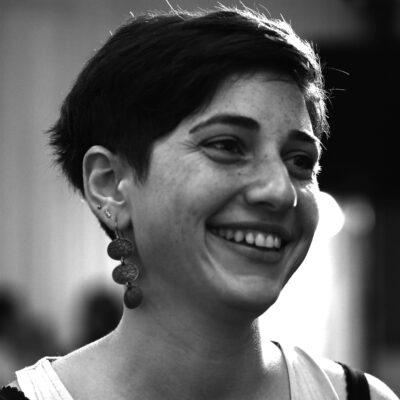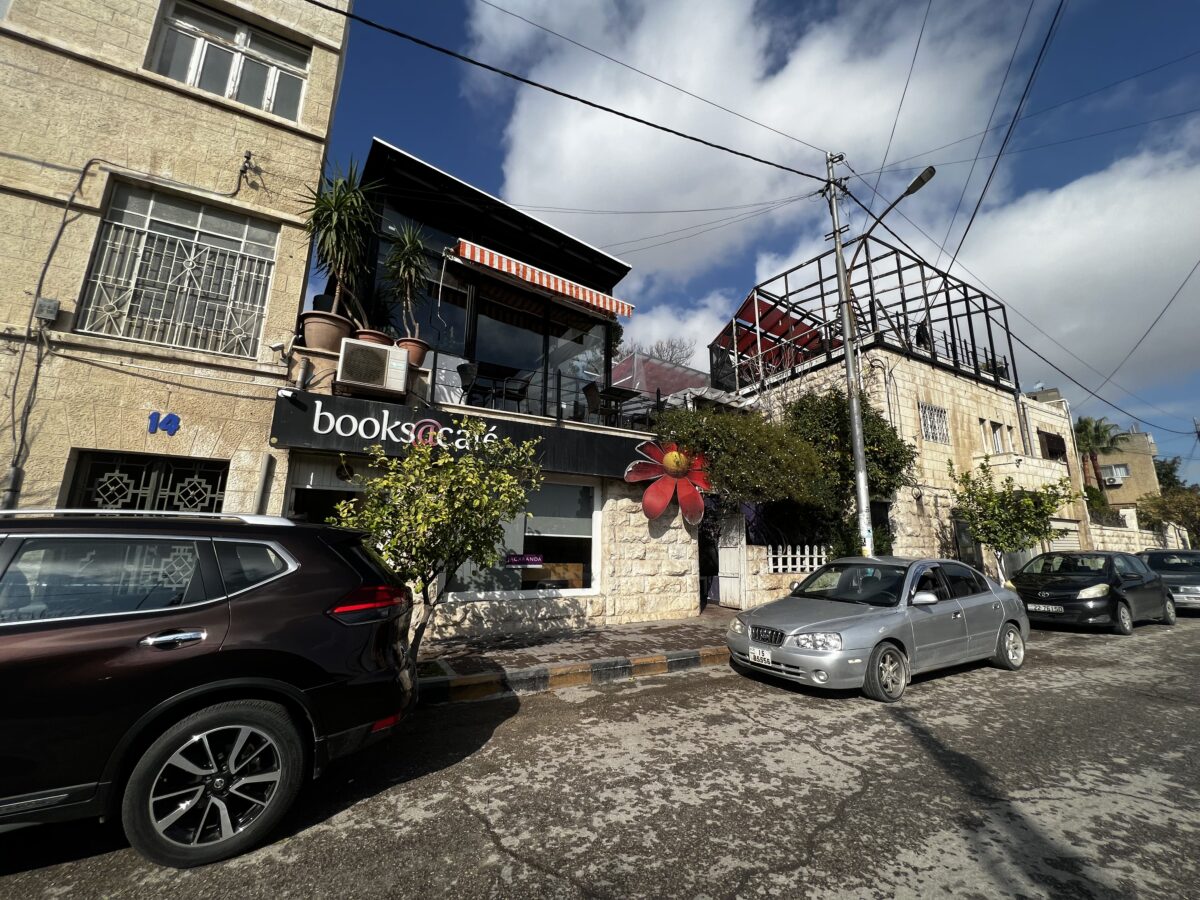
Jordan’s Books@Café
Shereen Zoumot
“Books@Café continues to be a place of inclusion and acceptance. It’s a tale that it assumed from its opening and it continues to be a safe space for people in crises.”
Books@Café is a café, bar and bookshop. It first began as an internet café and has since evolved into a multi-faceted establishment which supports the arts and cultural scene in Jordan while promoting equality and tolerance for the diverse groups in the community.
Strategies include:
-
Providing an oasis for all artists
Books@Café is a café and a bookshop; a place which encourages a love of books, reading and knowledge, while supporting diversity and tolerance in the community. -
Developing the arts and cultural sceneThe café is a platform for progressive talks and events to develop the arts and cultural scene in Jordan.
-
Facilitating employment opportunities for diverse and displaced peopleBooks@Café hires people from different backgrounds, including those from the LGBTQAI community, offering them a safe place of refuge and support.
Located just off the far end of Rainbow Street in Amman, Jordan, Books@Café was founded in 1997 by Median Al Jazeerah, a well-known and openly gay man, who is also an LGBTQAI, cultural and artistic activist. The street is a hub for tourist attractions and cultural and social events, and this café was a pioneer in the formation of this street, opening up opportunities for other shops to set up around the café. Since its opening, Al Jazeerah has welcomed many people from diverse backgrounds through the doors of his café, offering them a place to belong and feel safe; this has been Al Jazeerah’s mission since the café’s opening.
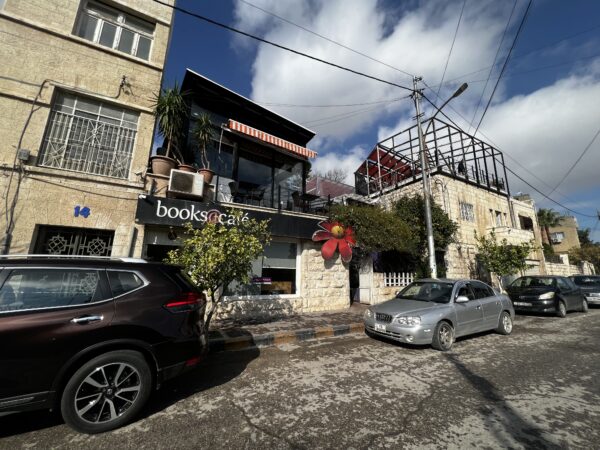
Books@Café is located off the far end of Rainbow Street in Amman. Photo credit: Shereen Zoumot.
Books@Café had begun as the first internet café in the Middle East, during an era when the world was newly introduced to the internet. Aside from selling their famous cheese fries, it also sold new and used books in their bookshop about HIV, sex and the arts which were avant-garde in nature, especially at a time in society when topics such as these were regarded as controversial and taboo.
When asking its long-time customers what the café meant to them, some responded that it was a place that allowed the underground Generation X back then, whether queer and straight, to bloom and be.
Providing a stimulating and inclusive haven
In the late 90s, books became a centre for human rights, a haven for people in distress; to this day, there is a sign outside the café saying, “Hate-free zone”. Hence, Al Jazeerah’s concept of combining a café with a bookshop to encourage a love of books and reading and the sharing of knowledge from people from all walks of life, while gathering for coffee, food, books, the internet and conversation. This is how lifelong friendships were formed back then. The café was an open space for the customers and even employees to hang out, converse and feel free, safe and be their true selves in a very comfortable atmosphere.
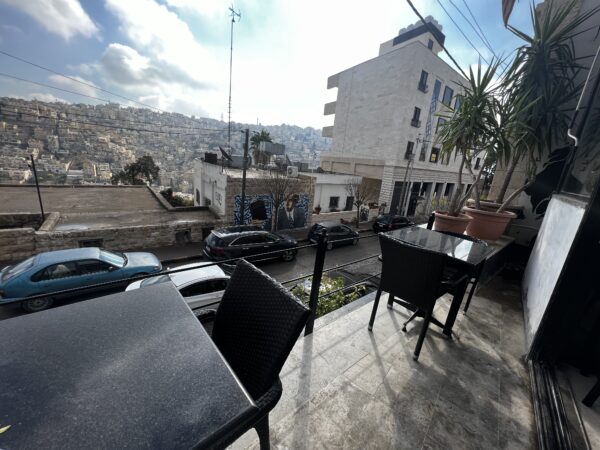
The café’s outdoor terrace seating offers magnificent views of Amman’s Old City and the ancient ruins at Al Qala’a (Citadel Hill). Photo credit: Shereen Zoumot.
The café stocks both new and used Arabic and international books on a wide variety of topics such as poetry, arts, fiction, lifestyle, religion, business, psychology, poetry as well as children’s books and comics.
“Books@Café continues to be a place of inclusion and acceptance. It’s a tale that it assumed from its opening and it continues to be a safe space for people in crises,” said Al Jazeerah.
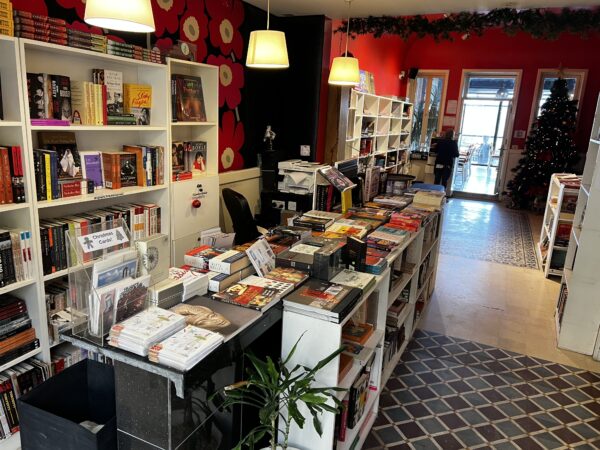
Books@Café’s bookshop stocks new and used books on a wide variety of topics. Photo credit: Shereen Zoumot.
Developing the arts and cultural scene
For the past two decades, Books@Café has provided a platform for the development of the arts and cultural scene in Jordan. It has been a safe and encouraging space for growth and exposure, hosting progressive talks and events for all. The first talks that were held at the café in its early days were about sex before marriage, HIV and AIDs. And according to Al Jazeerah, the calibre of people attending grew and diversified over time.
Over the years, many non-traditional book launches took place at the café as well as some concerts for underground music bands and poetry readings and recitals. One book launch was for a very important book, The Bride of Amman, by Jordanian author Fadi Zaghmout. It was and still is a very controversial novel that talks about being gay in Jordan and the many taboos and challenging traditions for women living there.
The café has forged an artistic and cultural revolution through its impactful activities, which, in turn, has nurtured sustainable and long-term, trusting friendships and bonds between the diverse communities in Jordan.
Al Jazeerah and Books@Café have become icons of inspiration and self-expression for many generations. This gave the floor for Al Jazeerah to start facilitating talks about LGBTQAI awareness in different NGOs and several embassies in Jordan. His community outreach in Jordan (and hence, globally) has built a strong reputation for Books@Café, enabling it to attract more people in need of help and shelter.
Facilitating employment opportunities for diverse and displaced people
Books@Café has made a difference by helping and is still helping people and saving lives.
“I subconsciously made it my safe space and then almost automatically it became the safe space for everyone else who was queer in Amman. I always hired easy-going and different people … LGBT people when I could and many refugees as well,” said Al Jazeerah. Many refugees from Iraq and Syria work at the café. Several of the employees are from the LGBTQAI community, with some trans and intersex individuals working as bartenders at the café’s bar.The existence of Books@Café has allowed the Arab community in Jordan to connect and grow stronger together and it has provided help for refugees and the LGBTQAI community when they are in danger.
Al Jazeerah says that his mission and dream, as he founded Books@Café, is to normalise and equalise everybody through assimilation and kindness and he wishes to continue to realise this dream now and into the future. “The logo of Books@Café is a flower because it is a unifying and universal symbol. We are different in many ways, but we are connected like the petals on a flower. This is the ethos of Books@Café.”

The café and bar serves a menu of local specialties and international dishes. At night, customers can enjoy cocktails while gazing out at the city lights of Amman. Photo credit: Shereen Zoumot.
Shereen Zoumot (she/her)
| Shereen Zoumot (she/her) is a Jordanian theatre-maker, performer, facilitator, and researcher. Shereen is a Chevening Scholar and obtained her MA in Performance Making at Goldsmiths University of London. Shereen has worked on international and regional projects, as a performer, director, and facilitator. Such as Egypt, Lebanon, UK, and Denmark. Her career took a big shift when she was the associate director for the international performance, “Queens of Syria,” which toured the UK in many cities. Her recent work revolves around queer, refugees, and women’s rights themes. She creates private performances in Jordan covering some of the taboos and sensitive themes in the MENA region. |
What is the Imagine Around the World Project?
A partnership with the British Council Australia, the Imagine Around The World Project aims to document case studies from numerous countries outside of US, UK, Canada, Australia and New Zealand to share best practice and leadership in cultural diversity, cultural equity and inclusion in the arts, screen and creative sectors. This project is managed by Diversity Arts Australia and supported by Creative Equity Toolkit partner, British Council Australia. To find out more click below – or read the other case studies as they go live here.

